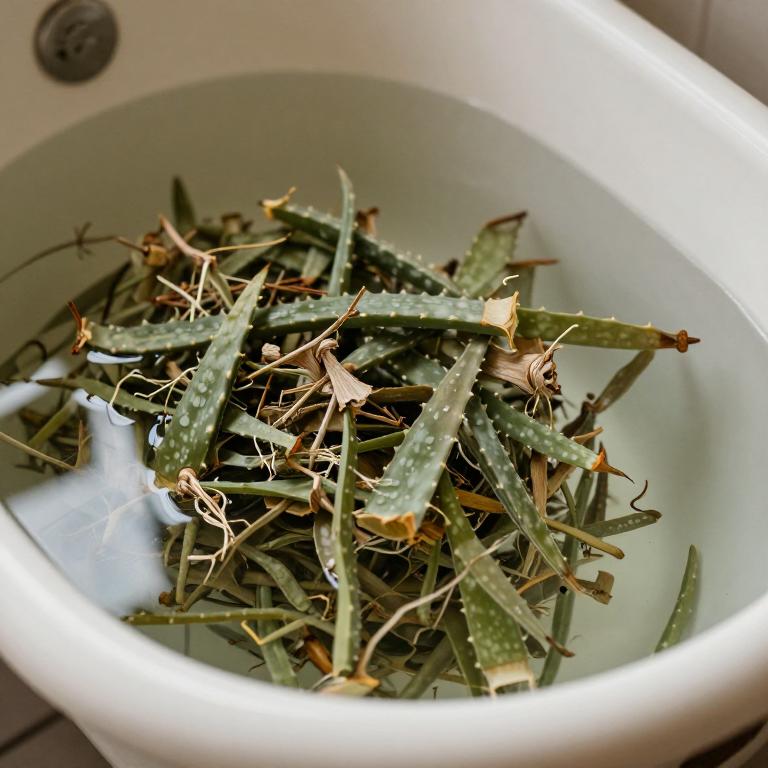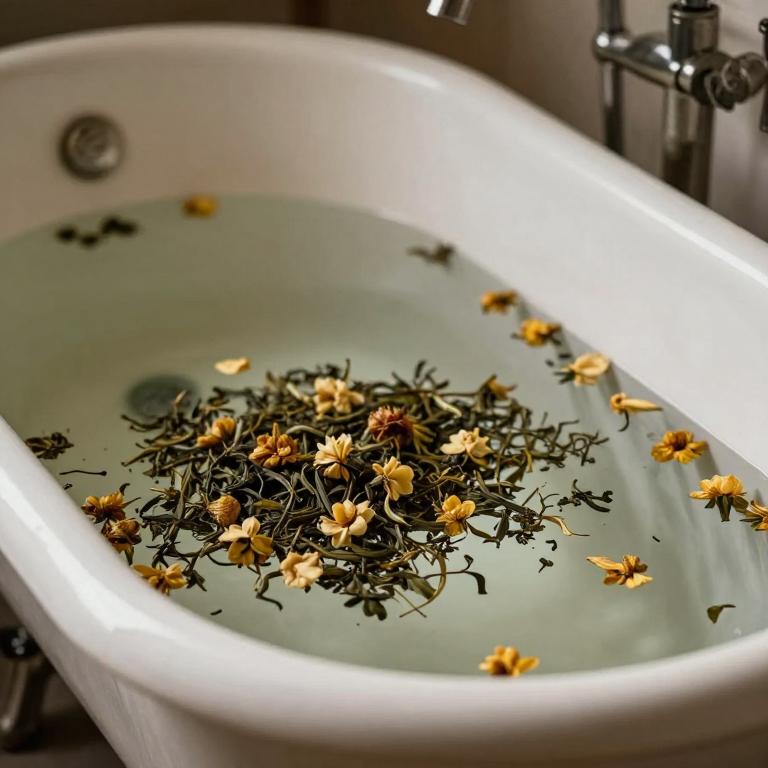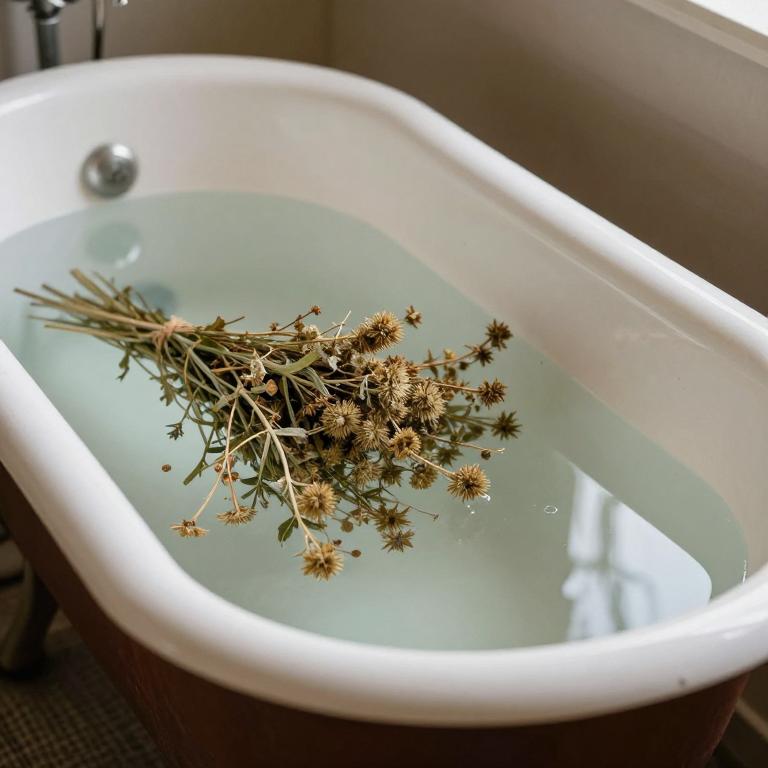10 Best Herbal Baths For Acne

Herbal baths for acne involve the use of natural herbs known for their anti-inflammatory and skin-soothing properties, such as chamomile, lavender, and green tea.
These herbs can help reduce redness, inflammation, and bacterial growth that contribute to acne breakouts. To prepare an herbal bath, simply steep the chosen herbs in hot water and add the infusion to a warm bath, allowing the skin to absorb the beneficial compounds. Regular use of herbal baths can complement traditional acne treatments by promoting a calming and detoxifying effect on the skin.
However, it's important to perform a patch test first to ensure no allergic reactions occur.
Table of Contents
- 1. Salvia (Salvia officinalis)
- 2. St. john's wort (Hypericum perforatum)
- 3. German chamomile (Chamomilla recutita)
- 4. Stinging nettle (Urtica dioica)
- 5. Aloe vera (Aloe barbadensis)
- 6. Dog rose (Rosa canina)
- 7. Field horsetail (Equisetum arvense)
- 8. Camellia (Camellia sinensis)
- 9. English lavender (Lavandula angustifolia)
- 10. Blessed thistle (Cnicus benedictus)
1. Salvia (Salvia officinalis)

Salvia officinalis, commonly known as sage, has been traditionally used in herbal baths for its potential benefits in treating acne.
The essential oils and compounds found in sage, such as thujone and rosmarinic acid, possess antimicrobial and anti-inflammatory properties that may help reduce bacterial growth and inflammation on the skin. When incorporated into a bath, sage can promote a soothing effect on the skin, potentially helping to clear up blemishes and improve overall skin texture. To use sage in a bath, one can add a few drops of sage essential oil or a handful of dried sage leaves to warm water.
However, it is important to perform a patch test and consult with a healthcare professional, especially for those with sensitive skin or existing skin conditions.
2. St. john's wort (Hypericum perforatum)

Hypericum perforatum, commonly known as St. John's Wort, has been traditionally used in herbal baths to help alleviate symptoms of acne due to its anti-inflammatory and antimicrobial properties.
When infused into bath water, the active compounds in hypericum, such as hyperforin and hypericin, may help reduce skin inflammation and redness associated with acne breakouts. The soothing warmth of the bath can also promote relaxation and improve overall skin health by increasing blood circulation to the skin's surface. However, it is important to note that some individuals may be sensitive to St. John's Wort, and it should be used with caution, especially if they are taking other medications due to potential interactions.
For best results, it is recommended to consult a healthcare professional before incorporating hypericum perforatum baths into a skincare routine.
3. German chamomile (Chamomilla recutita)

Chamomilla recutita, commonly known as German chamomile, is a popular herbal remedy used in baths to help alleviate acne-related skin issues.
The essential oils in chamomile, particularly bisabolol and chamazulene, possess anti-inflammatory and antimicrobial properties that can reduce redness, swelling, and bacterial growth on the skin. When added to warm water for a soothing bath, chamomile can help soothe irritated skin and promote a calming effect, which may reduce stress-related breakouts. It is often recommended for those with sensitive or acne-prone skin due to its gentle nature.
However, it is important to patch test before using chamomile baths to avoid any potential allergic reactions.
4. Stinging nettle (Urtica dioica)

Urtica dioica, commonly known as stinging nettle, has been traditionally used in herbal baths for its potential skin benefits, including the treatment of acne.
The plant contains compounds like histamine and formic acid, which can cause a tingling sensation when applied to the skin, but these same properties may help reduce inflammation and detoxify the skin. When used in a bath, stinging nettle can help open pores, draw out impurities, and soothe irritated skin, making it a natural remedy for acne-prone skin. However, it is important to properly prepare the nettle by boiling it to neutralize its stinging compounds before adding it to bath water.
While some people find relief from acne using nettle baths, it is advisable to consult a healthcare professional before incorporating it into a skincare routine, especially for those with sensitive skin or existing skin conditions.
5. Aloe vera (Aloe barbadensis)

Aloe barbadensis, commonly known as aloe vera, is often used in herbal baths to help manage acne due to its anti-inflammatory and soothing properties.
When added to bath water, aloe vera can help reduce redness and irritation associated with breakouts while promoting skin healing. Its ability to balance skin pH and moisturize without clogging pores makes it a beneficial addition for those with acne-prone skin. Regular use of aloe-infused baths may help prevent future breakouts and improve overall skin texture.
However, it is important to ensure the aloe used is pure and free from additives that could irritate sensitive skin.
6. Dog rose (Rosa canina)

Rosa canina, commonly known as rosehip, is a traditional herbal remedy that has been used for centuries to promote skin health and treat various skin conditions, including acne.
The oil extracted from the seeds of Rosa canina is rich in essential fatty acids, vitamins, and antioxidants, which can help reduce inflammation and redness associated with acne. When used in herbal baths, rosehip oil can gently nourish the skin, balance its natural oils, and support the healing process of blemishes. This natural treatment is particularly beneficial for individuals with sensitive or acne-prone skin, as it is non-irritating and soothing.
Incorporating Rosa canina herbal baths into a skincare routine can be a gentle and effective way to improve skin texture and reduce the appearance of acne over time.
7. Field horsetail (Equisetum arvense)

Equisetum arvense, commonly known as horsetail, has been traditionally used in herbal baths for its potential benefits in treating acne.
The plant is rich in silica, which can help strengthen skin tissue and improve its overall health. When used in a bath, the silica and other minerals in horsetail may help reduce inflammation and excess oil production, both of which are common contributors to acne. Some studies suggest that the anti-inflammatory and antimicrobial properties of horsetail can support skin healing and prevent future breakouts.
However, it is important to consult a healthcare professional before using horsetail baths, especially for those with sensitive skin or existing skin conditions.
8. Camellia (Camellia sinensis)

Camellia sinensis, commonly known as the tea plant, has been traditionally used in herbal remedies for its potential skin benefits.
When incorporated into herbal baths, camellia sinensis may help reduce acne due to its anti-inflammatory and antioxidant properties. The leaves contain compounds like polyphenols and caffeine, which can help regulate sebum production and soothe skin irritation. These baths are believed to promote a clearer complexion by reducing bacterial growth and calming redness associated with acne.
However, while some anecdotal evidence supports its use, more scientific research is needed to fully understand its efficacy for acne treatment.
9. English lavender (Lavandula angustifolia)

Lavandula angustifolia, commonly known as English lavender, is widely used in herbal baths for its calming and therapeutic properties.
When added to bathwater, lavender essential oil or dried lavender flowers can help reduce inflammation and soothe irritated skin, making it beneficial for individuals with acne. The anti-inflammatory and antimicrobial compounds in lavender may help combat the bacteria that contribute to acne breakouts. Regular use of lavender-infused baths can also promote relaxation and reduce stress, which is a known trigger for acne flare-ups.
Overall, lavender baths offer a natural, aromatherapeutic approach to supporting skin health and managing acne symptoms.
10. Blessed thistle (Cnicus benedictus)

Cnicus benedictus, also known as blessed thorn, has been traditionally used in herbal baths to address skin conditions such as acne.
The plant contains compounds like flavonoids and tannins, which possess anti-inflammatory and antimicrobial properties that may help reduce acne-related inflammation and prevent bacterial growth on the skin. To prepare a herbal bath, dried Cnicus benedictus can be steeped in hot water and then added to a warm bath, allowing the skin to absorb its beneficial properties. Regular use of such baths may help soothe irritated skin and promote clearer skin over time.
However, it is advisable to consult a healthcare professional before incorporating this herb into a skincare routine, especially for those with sensitive skin or existing dermatological conditions.